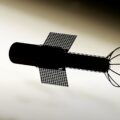Quantum entanglement in top quarks has been demonstrated, according to physicists at CERN who say the discovery offers new insights into the behavior of fundamental particles and their interactions at distances that cannot be attained by light-speed communication.
The research, led by University of Rochester professor Regina Demina, extends the phenomenon known as “spooky action at a distance” to the heaviest particles recognized by physicists and offers important new insights into high-energy quantum mechanics.
Initially discovered almost three decades ago, top quarks are the most massive elementary particles that have been observed. The mass of these unique particles originates from their coupling to the Higgs boson, the famous particle predicted in theory regarding the unification of the weak and electromagnetic interactions. According to the Standard Model of particle physics, this coupling is the largest that occurs at the scale of the weak interactions and those above it.
In the past, quantum entanglement has been observed in stable particles, including electrons and photons. In their new research, Demina and her team demonstrate entanglement between unstable top quarks and their antimatter counterparts, revealing spin correlations that occur over distances that extend beyond the transfer of information at light speed.
The findings present new challenges to existing models and expand our understanding of particle behavior at extreme energies.
The experiment was conducted at the European Center for Nuclear Research (CERN) as part of the Compact Muon Solenoid (CMS) Collaboration. CERN is home to the famous Large Hadron Collider (LHC), a device that propels high-energy particles at speeds nearing those of light across a 17-mile underground track.
Given the amount of energy required for the production of top quarks, such processes can only be achieved at facilities like CERN. The results of Demina’s recent study could help to shed some light on how long entanglement persists, as well as whether it can be extended to “daughter” particles or decay products. The research also may help determine whether entanglement between particles can be broken.
Presently, it is believed that the universe was in an entangled state following its initial fast expansion stage. The revelation of entanglement in top quarks may help scientists like Demina better understand what factors may have contributed to the quantum connection in our world becoming diminished over time, ultimately leading to the state in which our reality exists today.
Additionally, the experiment’s results could have applications in the growing area of quantum information science. While top quarks are not a good fit for use with quantum computers, the recent findings may nonetheless be helpful in providing researchers a better understanding of their entanglement properties, which could also shed light on how quantum connections are either maintained or disrupted.
Ultimately, the new findings made possible by CERN could challenge our current widely accepted understanding of quantum mechanics while setting the pace for future studies of quantum phenomena that may help add missing pieces to the puzzle of our cosmic origins and the fundamental laws that govern reality.
Micah Hanks is the Editor-in-Chief and Co-Founder of The Debrief. He can be reached by email at micah@thedebrief.org. Follow his work at micahhanks.com and on X: @MicahHanks.

